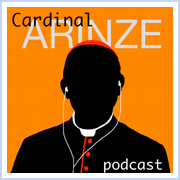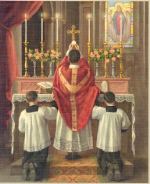Gospel From: Luke 23:35-43The Crucified Christ is Mocked
------------------------------
[35] And the people stood by, watching; but the rulers scoffed at Him (Jesus), saying, "He saved others; let Him save Himself, if He is the Christ of God, His Chosen One!" [36] The soldiers also mocked Him, coming up and offering Him vinegar, [37] and saying, "If You are the King of the Jews, save Yourself!" [38] There was also an inscription over Him, "This is the King of the Jews."
The Good Thief
--------------
[39] One of the criminals who were hanged railed at Him, saying, "Are You not the Christ? Save Yourself and us!" [40] But the other rebuked him, saying, "Do you not fear God, since you are under the same sentence of condemnation? [41] And we indeed justly: fo r we are receiving the due reward of our deeds; but this man has done nothing wrong." [42] And he said, "Jesus, remember me when you come in Your kingly power." [43] And He said to him, "Truly, I say to you, today you will be with Me in Paradise."
*******************
Commentary:
35. The Roman governor's soldiers join the Jewish people and their leaders in mocking Jesus; thus, everyone--Jews and Gentiles--contributed to making Christ's passion even more bitter. But we should not forget that we too make a mockery of our Lord every time we fall into sin or fail to respond sufficiently to grace. This is why St. Paul says that those who sin "crucify the Son of God on their own account and hold Him up to contempt" (Hebrews 6:6).
39-43. The episode of the two thieves invites us to admire the designs of divine providence, of grace and human freedom.&nbs p; Both thieves are in the same position--in the presence of the Eternal High Priest as He offers Himself in sacrifice for them for all mankind. One of them hardens his heart, despairs and blasphemes, while the other repents, prays with confidence to Christ and is promised immediate salvation. "The Lord," St. Ambrose comments, "always grants more than one asks: the thief only asked Him to remember Him, but the Lord says to him, `Truly, I say to you, today, you will be with Me in Paradise.' Life consists in dwelling with Jesus Christ, and where Jesus Christ is there is His Kingdom" ("Expositio Evangelii Sec. Lucam, in loc.). "It is one thing for man to judge someone he does not know; another, for God, who can see into a person's conscience. Among men, confession is followed by punishment; whereas confession to God is followed by salvation" (St. John Chrysostom, "De Cruce Et Latrone").
While we make our way through life, we all sin, but we can all repent also. God is always waiting for us with His arms wide open, ready to forgive us. Therefore, no one should despair: everyone should try to have a strong hope in God's mercy. But no one may presume that he will be saved, for none of us can be absolutely certain of our final perseverance (cf. Council of Trent, "De Justificatione", Canon 16).
This relative uncertainty is a spur God gives us to be ever vigilant; this vigilance in turns helps us progress in the work of our sanctification as Christians.
42. "Many times have I repeated that verse of the eucharistic hymn: "Peto quod petivit latro poenitens," and it always fills me with emotion: to ask like the penitent did! He recognized that he himself deserved that awful punishment.... And with a word he stole Christ's heart and `opened up for himself' the gates of Heaven" ([St] J. Escriva, "The Way of the Cross", XII, 4).
43. In responding to the good thief, Jesus reveals that He is God, for He has power over man's eternal destiny; and He also shows that He is infinitely merciful and does not reject the soul who sincerely repents. Similarly by these words Jesus reveals to us a basic truth of faith: "We believe in eternal life. We believe that the souls of all who die in the grace of Christ--whether they must still make expiation in the fire of Purgatory, or whether from the moment they leave their bodies they are received by Jesus Christ into Paradise like the good thief--go to form the People of God which succeeds death, death which will be totally destroyed on the day of the Resurrection when these souls are reunited with their bodies" (Pope Paul VI, "Creed of the People of God", 28).
***************
Source: "The Navarre Bible: Text and Commentaries". Biblical text taken from the Revised Standard Version and New Vulgate. Commentaries made by members of the Faculty of Theology of the University of Navarre, Spain. Published by Four Courts Press, Kill Lane, Blackrock, Co. Dublin, Ireland.
Reprinted with permission from Four Courts Press and Scepter Publishers, the U.S. publisher.









